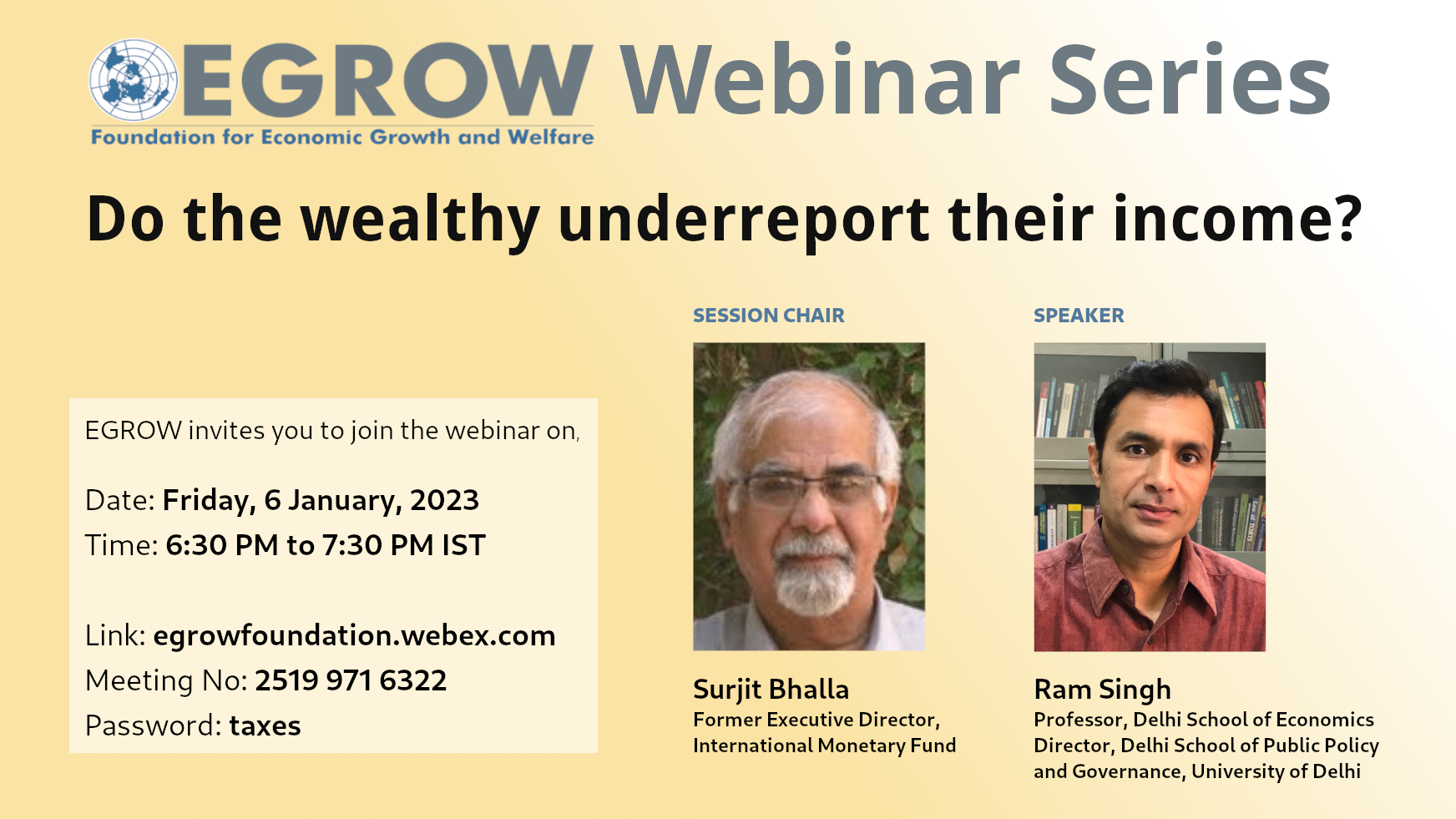Do the wealthy underreport their income?

Webinar Link
Meeting No: 2519 971 6322
Password: taxes
Abstract
The income reporting behaviour of different wealth groups is a critical public finance issue that has remained under-researched in the Indian and international contexts. We model and estimate the relationship between wealth and reported income for individuals and families across different wealth groups. We use a new dataset based on affidavits filed by election contestants along with the Forbes List of billionaires, and statistics published by the Indian Tax Department. We show that wealthier is the individual or the family, the lesser is the reported income relative to wealth. On average, a 1% increase in the family wealth is associated with a decrease of more than 0.5% in the reported income as a ratio of wealth. The total income reported by the bottom 10% of families in the data amounts to more than 188% of their wealth; in contrast, the wealthiest 5% [respectively 0.1%] of families reported incomes that were just 4% [respectively 2%] of their wealth. The total income reported by the wealthiest Forbes list families is less than 0.6% of their wealth. From another perspective, the total income reported by the wealthiest 0.1% of families is only about a fifth of the returns from their capital, and at least 80% of their capital income goes unreported in the income tax returns. For the Forbes-listed 100 families, more than 90% of the capital returns do not figure in their reported incomes! The income-wealth ratios for affluent individuals exhibit very similar patterns. We discuss the processes responsible for the “missing” income of the wealthy groups, and show that this “missing” income leads to an underestimation of income inequality.
Furthermore, it reduces the tax liability of the wealthiest percentile group to a mere 1% of their wealth. The tax liability of the wealthiest 0.1 centile and the Forbes-listed families is less than onetenth of their capital income. Tax paid by these groups relative to their wealth is smaller than the relative tax liability for middle-wealth groups. Finally, we show that ceteris paribus, women report lower incomes than men, and that individuals exposed to greater media and civil society scrutiny report relatively high incomes. Our analysis suggests that recent measures taken by the Indian central government against illicit income and wealth hoarding have delivered the intended results.
About the Speakers
Surjit Bhalla
Dr Surjit S Bhalla is the Former Executive Director IMF, representing India, Sri Lanka, Bangladesh and Bhutan. He holds a PhD in Economics from Princeton University. He is a former part-time member of Hon'ble Prime Minister Narendra Modi’s Economic Advisory Council. In addition, he served as Chairperson for the Ministry of Commerce High Level Advisory Group on Trade; Economic Adviser to the Fifteenth Finance Commission, Government of India. He is a regular Invitee to the Aspen Institute Program on World Economy, USA, 2002-present. He was also a Contributing Editor for Indian Express (2014-2019). He was Founder-Chairman of Oxus Research & Investments 1997-2017.
Ram Singh
Prof. Ram Singh is the director of Delhi School of Public Policy and Governance (DSPPG) and a Professor at Delhi School of Economics. He did his Ph.D. (Economics) from Jawaharlal Nehru University and Post-Doctorate from Harvard University and has been a Fellow at London School of Economics. He is recipient of several awards and honours including Fulbright, Commonwealth, Erasmus Mundus and DAAD fellowships. He has taught at Brown University, Universities of Hamburg, and Heidelberg among others.
Prof. Ram Singh has published in leading international journals including Journal of Economics, Journal of Law and Economics, American Law and Economics Review, European Journal of Economics. He writes Op-eds regularly for leading national newspapers – especially The Economic Times, The Hindu and Dainik Bhaskar (Hindi). Areas of his expertise are public economics, law and economics, contract theory, taxes, banking and financial regulation. He appeared for the Standing Committees of the Parliamentary and has served on several committees of Government of India, including as a member of the 7th Pay Review Panel. Currently he is a member of the Board of Governors of Indian Institute of Corporate Affairs, and the expert panel of the Empowered Expert Committee on Institute of Eminence.